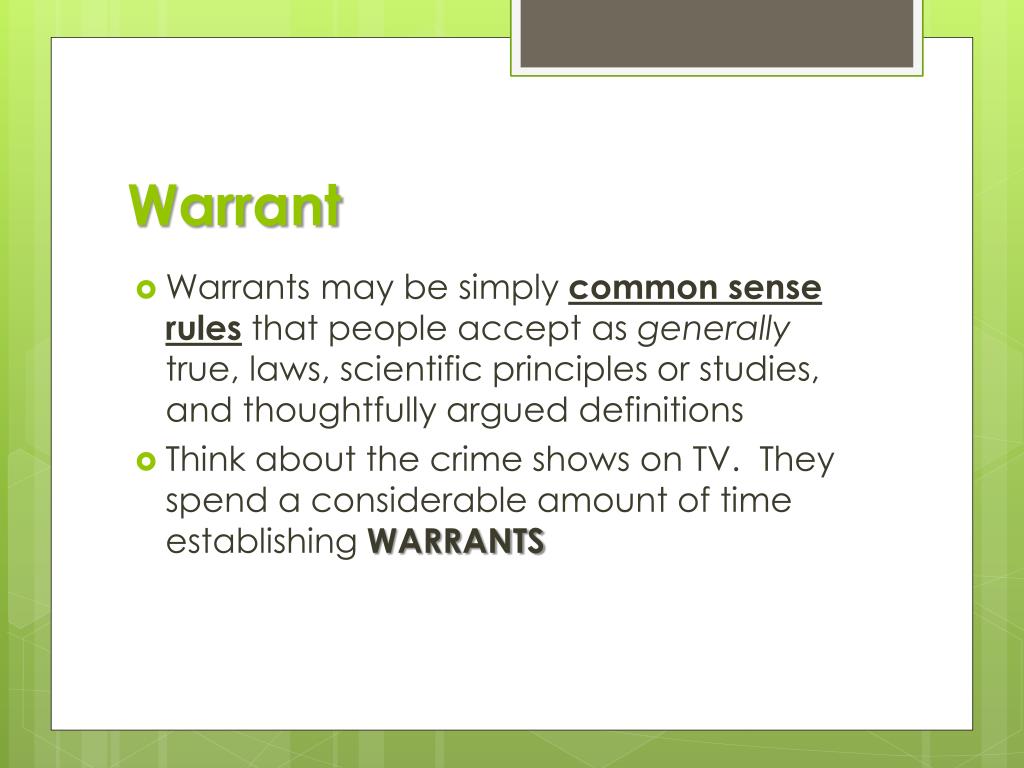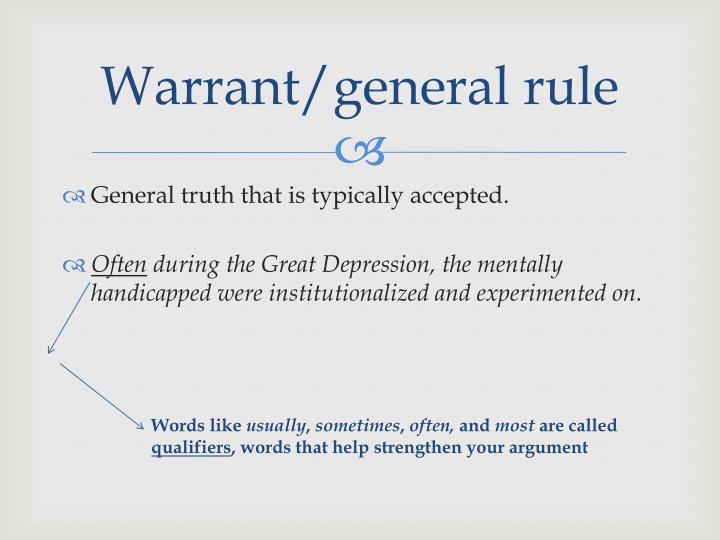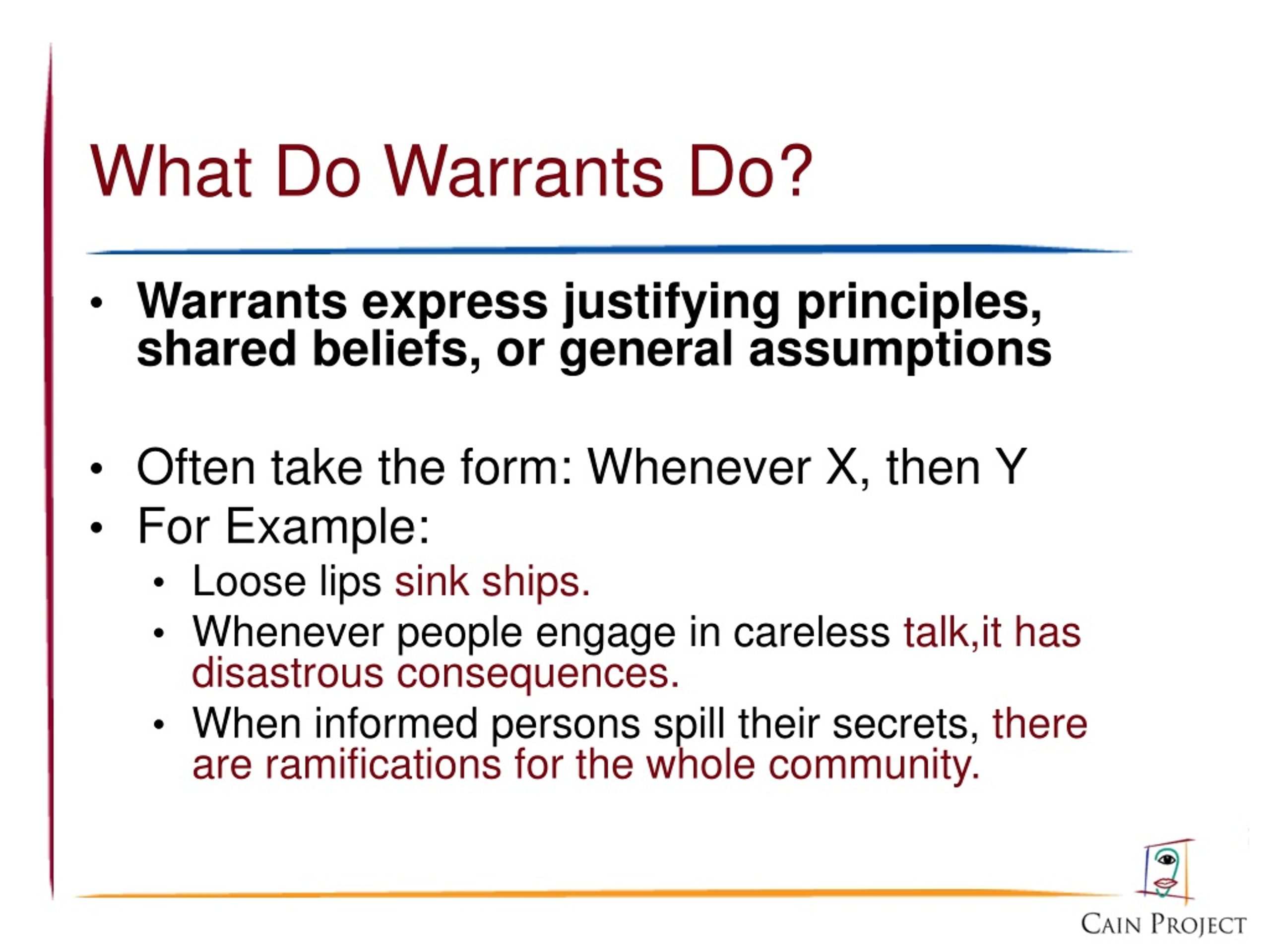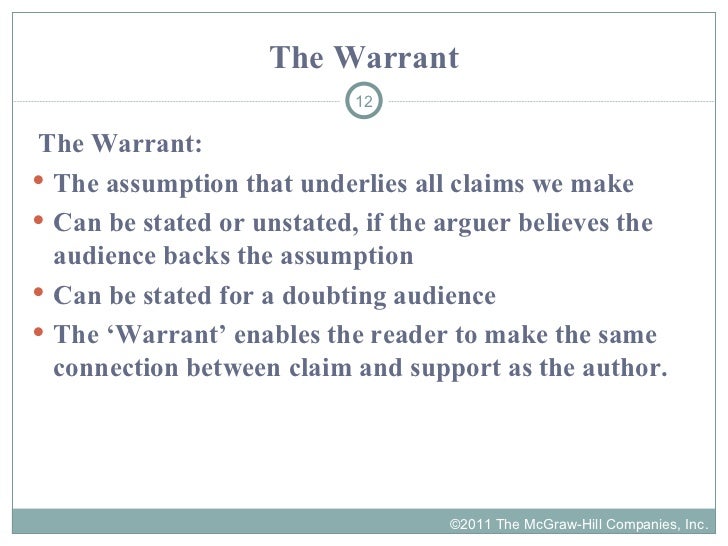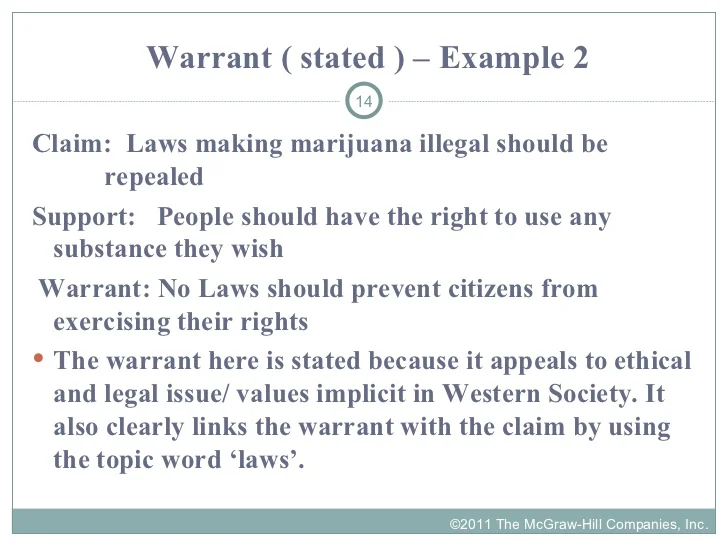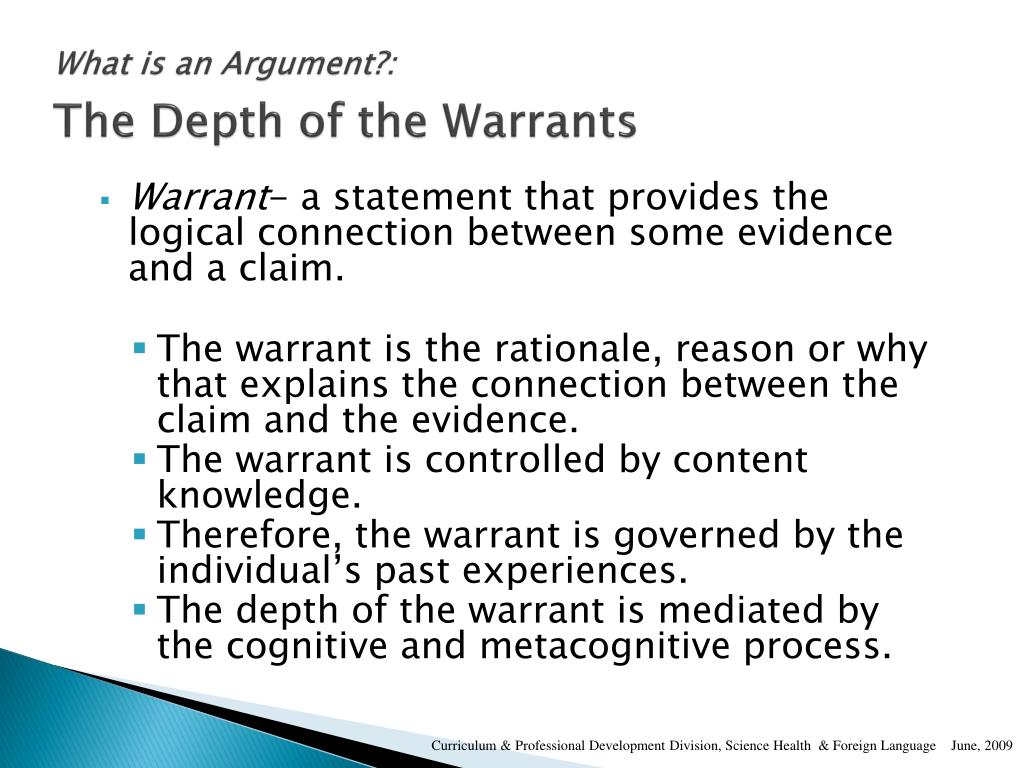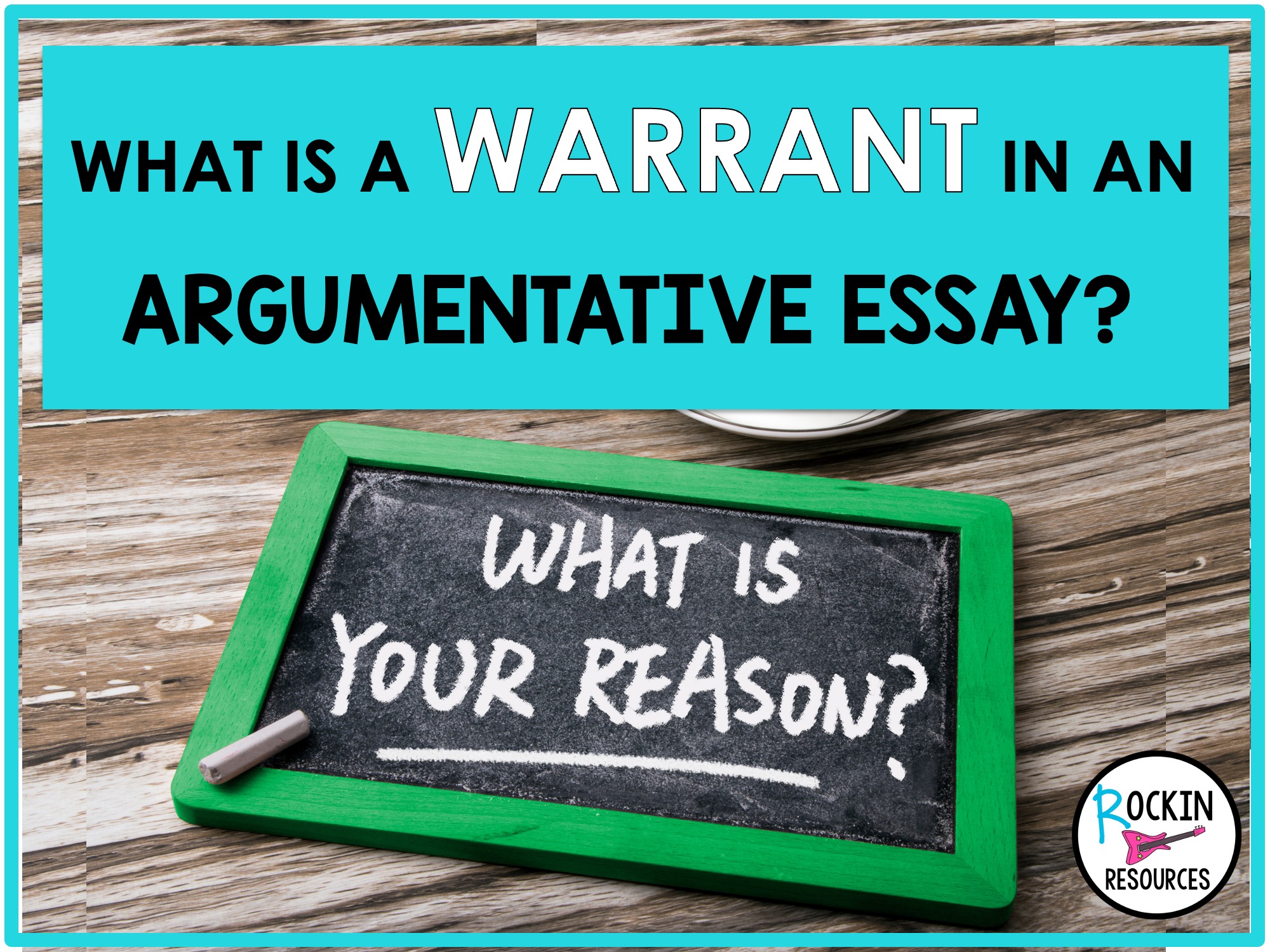What Is Warrant In An Argument - In many arguments, warrants are often. What is a warrant in argumentative writing? Warrants, they say, let[.] you connect a particular claim to particular evidence validly. In toulmin’s method, every argument begins with three fundamental parts: Warrants may be based on logos, ethos or pathos, or values that are assumed to be shared with the listener. A claim is the assertion that. They are like explanations that we know to be true (or think. A warrant is a underlying assumption or principle that connects the claim to the data in. The claim, the grounds, and the warrant. Sometimes an argument needs further reinforcement through the use of what is known as a warrant, which is an underlying belief that.
A claim is the assertion that. Warrants, they say, let[.] you connect a particular claim to particular evidence validly. What is a warrant in argumentative writing? They are like explanations that we know to be true (or think. Warrants may be based on logos, ethos or pathos, or values that are assumed to be shared with the listener. In many arguments, warrants are often. A warrant is a underlying assumption or principle that connects the claim to the data in. Sometimes an argument needs further reinforcement through the use of what is known as a warrant, which is an underlying belief that. In toulmin’s method, every argument begins with three fundamental parts: The claim, the grounds, and the warrant.
Warrants may be based on logos, ethos or pathos, or values that are assumed to be shared with the listener. What is a warrant in argumentative writing? Warrants, they say, let[.] you connect a particular claim to particular evidence validly. A claim is the assertion that. The claim, the grounds, and the warrant. They are like explanations that we know to be true (or think. In many arguments, warrants are often. A warrant is a underlying assumption or principle that connects the claim to the data in. In toulmin’s method, every argument begins with three fundamental parts: Sometimes an argument needs further reinforcement through the use of what is known as a warrant, which is an underlying belief that.
PPT Argumentative Writing PowerPoint Presentation, free download ID
A claim is the assertion that. Sometimes an argument needs further reinforcement through the use of what is known as a warrant, which is an underlying belief that. Warrants may be based on logos, ethos or pathos, or values that are assumed to be shared with the listener. What is a warrant in argumentative writing? The claim, the grounds, and.
PPT Argument terms PowerPoint Presentation ID2095605
What is a warrant in argumentative writing? A warrant is a underlying assumption or principle that connects the claim to the data in. Warrants, they say, let[.] you connect a particular claim to particular evidence validly. In toulmin’s method, every argument begins with three fundamental parts: They are like explanations that we know to be true (or think.
PPT Writing Module Three Five Essential Parts of Argument PowerPoint
The claim, the grounds, and the warrant. Warrants, they say, let[.] you connect a particular claim to particular evidence validly. Sometimes an argument needs further reinforcement through the use of what is known as a warrant, which is an underlying belief that. A warrant is a underlying assumption or principle that connects the claim to the data in. In toulmin’s.
PPT ARGUMENTATIVE WRITING BASED UPON THE STEPHEN TOULMIN MODEL FOR
A warrant is a underlying assumption or principle that connects the claim to the data in. The claim, the grounds, and the warrant. Warrants may be based on logos, ethos or pathos, or values that are assumed to be shared with the listener. Sometimes an argument needs further reinforcement through the use of what is known as a warrant, which.
PPT Writing Arguments PowerPoint Presentation, free download ID387550
The claim, the grounds, and the warrant. Warrants may be based on logos, ethos or pathos, or values that are assumed to be shared with the listener. A warrant is a underlying assumption or principle that connects the claim to the data in. In toulmin’s method, every argument begins with three fundamental parts: What is a warrant in argumentative writing?
Argument pp 1
Warrants may be based on logos, ethos or pathos, or values that are assumed to be shared with the listener. In toulmin’s method, every argument begins with three fundamental parts: Warrants, they say, let[.] you connect a particular claim to particular evidence validly. Sometimes an argument needs further reinforcement through the use of what is known as a warrant, which.
The Structure of an Argument ppt video online download
A warrant is a underlying assumption or principle that connects the claim to the data in. In many arguments, warrants are often. A claim is the assertion that. Warrants may be based on logos, ethos or pathos, or values that are assumed to be shared with the listener. What is a warrant in argumentative writing?
Argument pp 1
The claim, the grounds, and the warrant. In toulmin’s method, every argument begins with three fundamental parts: A claim is the assertion that. They are like explanations that we know to be true (or think. In many arguments, warrants are often.
PPT The Art of Argumentation PowerPoint Presentation, free download
In toulmin’s method, every argument begins with three fundamental parts: What is a warrant in argumentative writing? Warrants may be based on logos, ethos or pathos, or values that are assumed to be shared with the listener. They are like explanations that we know to be true (or think. Warrants, they say, let[.] you connect a particular claim to particular.
WHAT IS A WARRANT IN AN ARGUMENTATIVE ESSAY? Rockin Resources
In many arguments, warrants are often. A warrant is a underlying assumption or principle that connects the claim to the data in. Warrants may be based on logos, ethos or pathos, or values that are assumed to be shared with the listener. The claim, the grounds, and the warrant. In toulmin’s method, every argument begins with three fundamental parts:
In Many Arguments, Warrants Are Often.
Sometimes an argument needs further reinforcement through the use of what is known as a warrant, which is an underlying belief that. A warrant is a underlying assumption or principle that connects the claim to the data in. In toulmin’s method, every argument begins with three fundamental parts: Warrants may be based on logos, ethos or pathos, or values that are assumed to be shared with the listener.
A Claim Is The Assertion That.
Warrants, they say, let[.] you connect a particular claim to particular evidence validly. They are like explanations that we know to be true (or think. The claim, the grounds, and the warrant. What is a warrant in argumentative writing?
